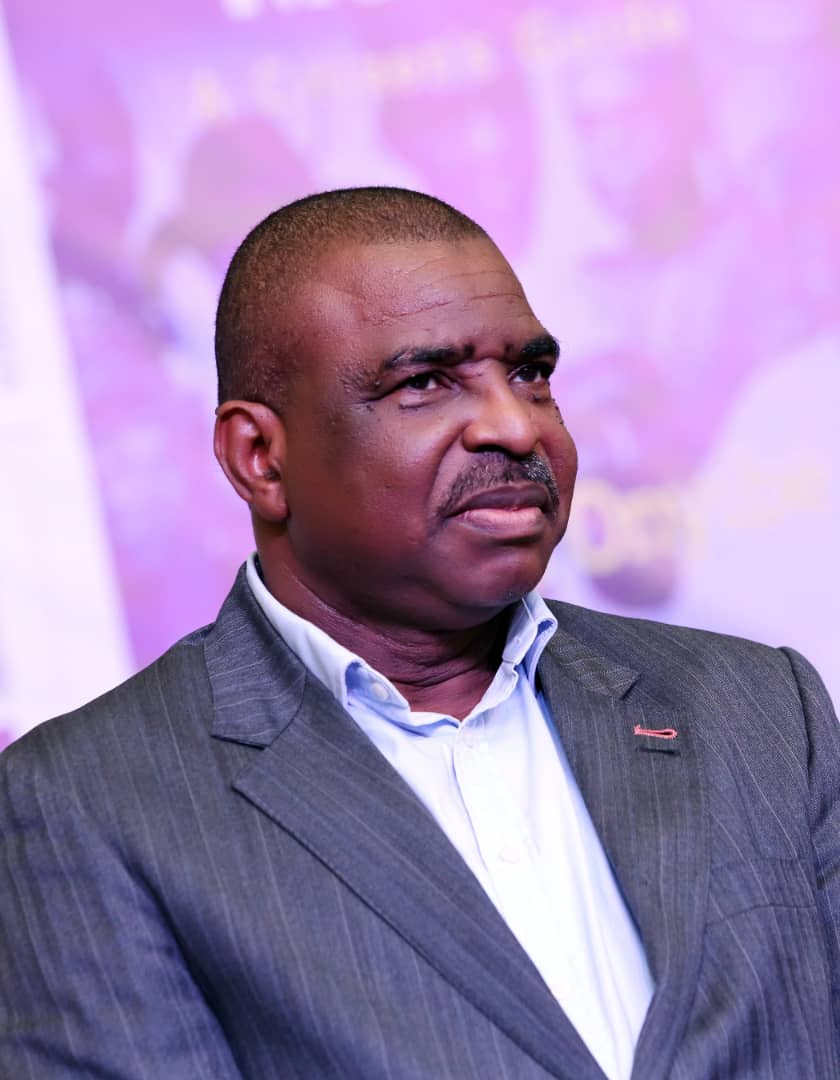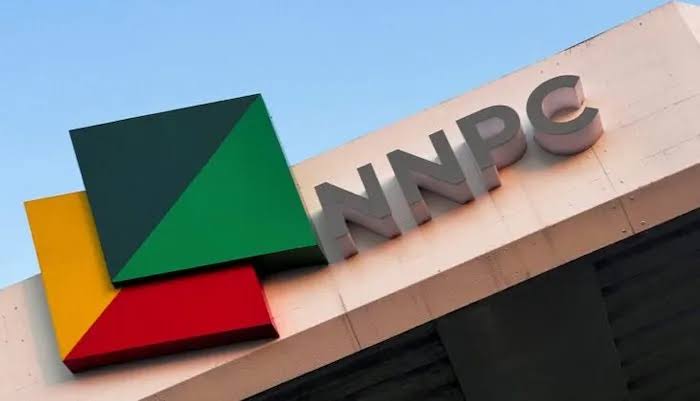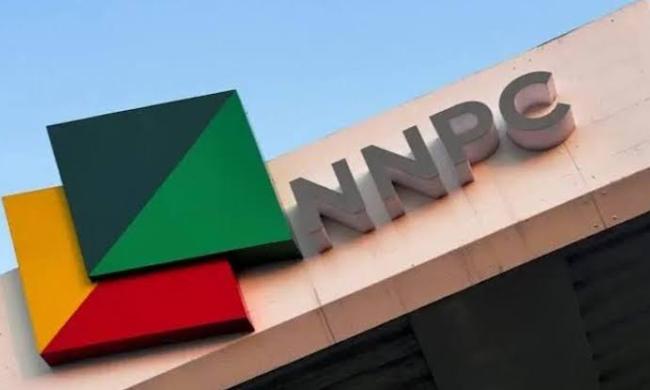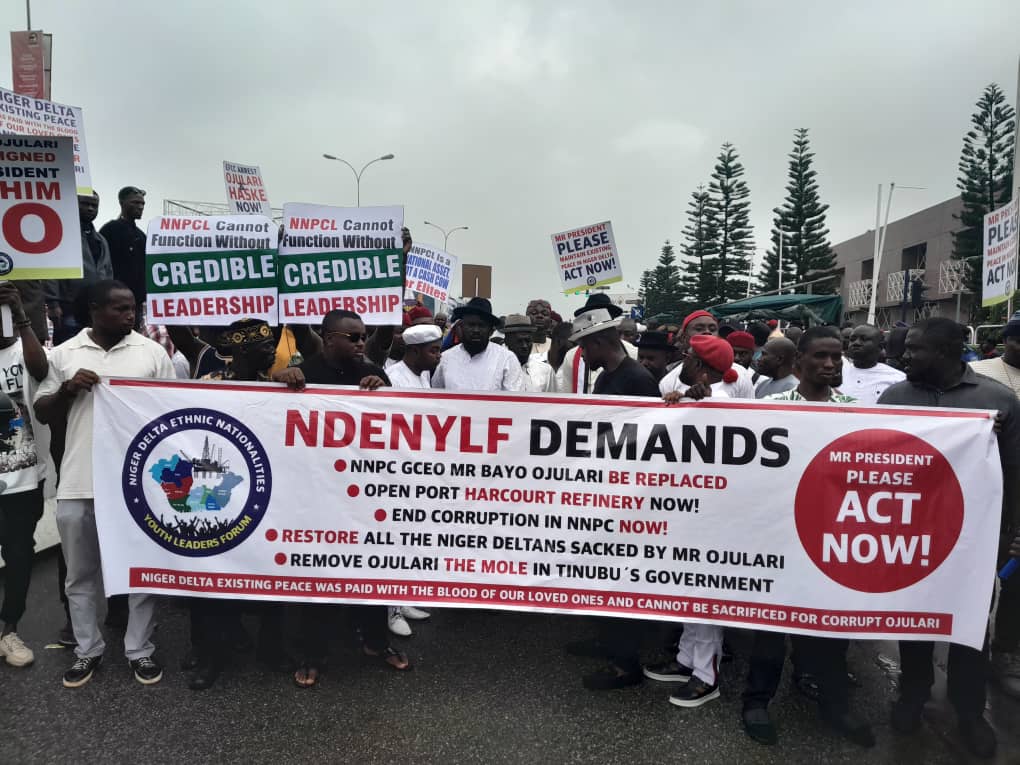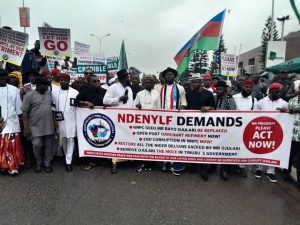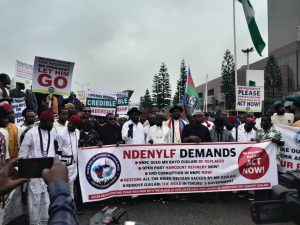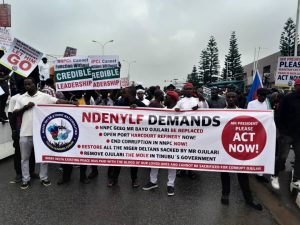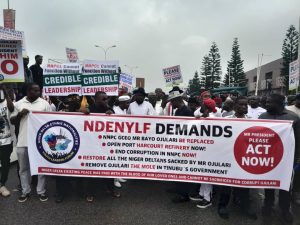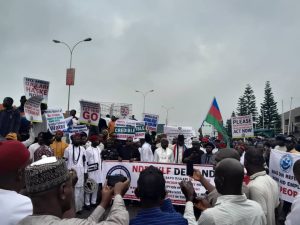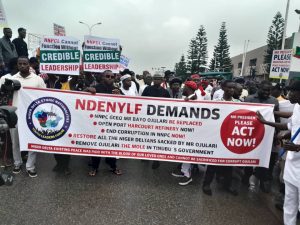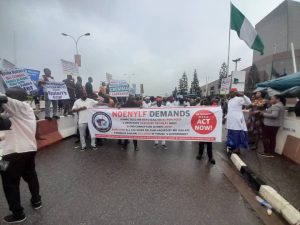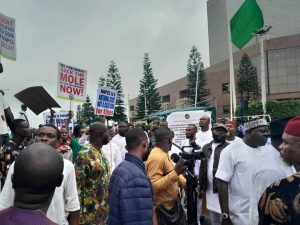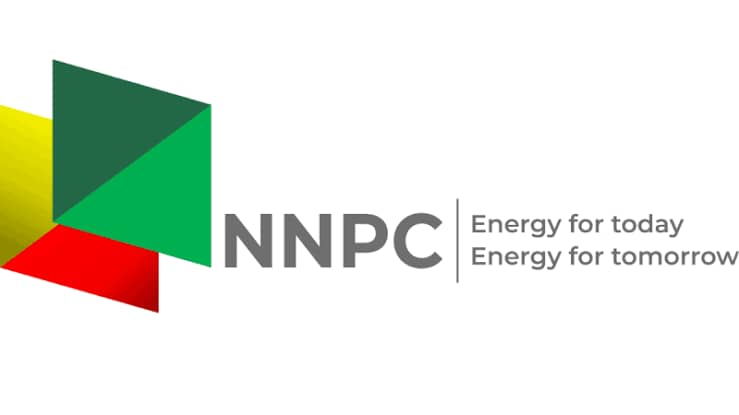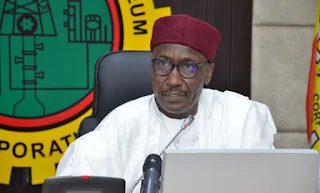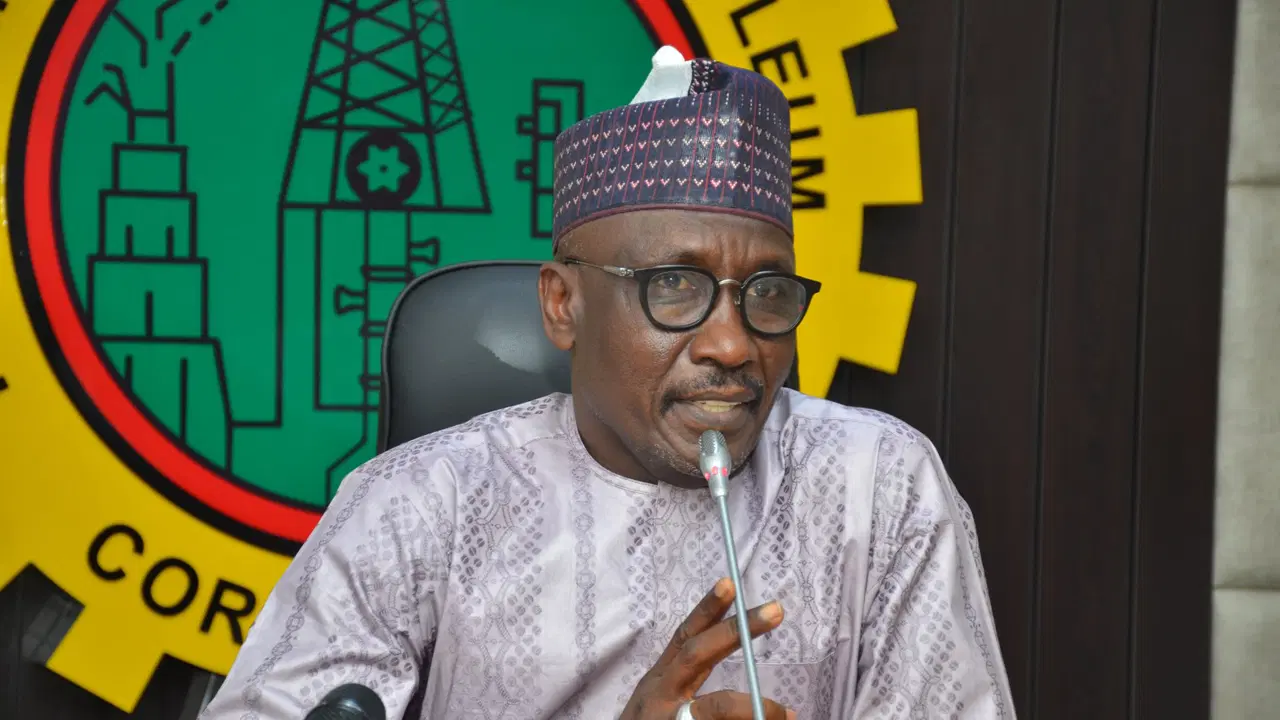The Nigerian National Petroleum Company Limited (NNPC) is once again in the spotlight, not for efficiency, but for the lingering question: should Nigeria sell its comatose refineries or keep wasting money on them?
Reports in the public space indicate that in the past three years, about half a billion dollars have been sunk into rehabilitating the Port Harcourt and Warri refineries, yet they remain idle. Even Aliko Dangote, whose private refinery is the continent’s largest, has dismissed them as “scrap.” Still, government funds continue to be poured into these obsolete plants—a practice likened to flogging a dead horse.
This mismanagement has now triggered deeper cracks. The NNPC workforce—over 5,500 strong—is threatening a nationwide strike over alleged irregularities, while confusion surrounds the purported resignation of Group Managing Director, Bayo Ojulari, who later denied stepping down. The episode underscores the mounting crisis in the oil giant.
Ojulari has hinted at the obvious solution: selling the refineries. With a combined capacity of 445,000 barrels per day—smaller than the 650,000 barrels of the Dangote refinery—these facilities have consistently failed despite repeated injections of public funds. Meanwhile, Nigeria’s private sector has demonstrated the capacity to deliver results, as seen in telecoms and power generation after government divestment.
The refineries are plagued by outdated infrastructure, mismatched imported parts, and ballooning maintenance costs. Experts argue that privatization would spur competition, stabilize fuel supply, strengthen the naira by reducing forex demand for imports, and ease the government’s financial burden. And potential buyers already exist: independent marketers, modular refinery operators, and possibly Dangote Refinery.
The case for privatization isn’t new. In August 2023, I argued in this column that selling the refineries was the only logical step under “Tinubunomics: Time To Sell The Petroleum Refineries.” After over N11 trillion wasted on maintenance between 2010 and 2020, the facilities remain deadweight. Labor unions continue to demand their rehabilitation, but this is neither realistic nor sustainable.
Saudi Aramco and Brazil’s Petrobras long ago shifted focus to more viable projects, leaving inefficient state-run refineries behind. Nigeria must do the same. The longer the government delays, the deeper the crisis within NNPC will fester.
The choice before President Tinubu’s administration is simple: either keep wasting billions propping up dead refinery assets or allow private investors to take over, revive them, and deliver results.
It was the Greek philosopher Heraclitus who famously said: “Everything changes, and nothing stands still.” Unfortunately, the last leadership at NNPCL seemed resistant to change, clinging to old, unproductive refineries that have drained Nigeria’s scarce resources for decades.
Most of the socio-economic problems confronting the current administration are not new; many stretch back forty years, while others are as recent as three. That is why I often revisit my archive of past writings, where proposed solutions to recurring crises remain relevant but unimplemented. One such crisis is the persistent dysfunction at the Nigerian National Petroleum Company Limited (NNPCL).
Modeled after global energy giants like Saudi Aramco and Brazil’s Petrobras, NNPCL has struggled since its inception. Established in 1971 as the Nigerian National Oil Company (NNOC), it became NNPC in 1977. Yet, despite its strategic importance, it has consistently failed to operate with the efficiency expected of a national oil company.
Below is the article l wrote and published dwelling on the same matter on 15 August 2023 which is about three (3) years ago.
Strikingly, it appears to have become inevitable that I keep falling back on my old articles to address current issues. That is perhaps because” The more things change, the more they remain the same. That is according to Jean-Baptiste Alphonse Karr, a French critic, journalist, and writer.
Nevertheless, I am reproducing this roughly two-year-old piece which is more or less an advisory with the hope that it might catch the interest of a patriotic leader who wants the best for Nigeria.
Here we go:
“Tinubunomics: Time To Sell The Petroleum Refineries ” originally published on 15 August 2023.
The first loud alarm in recent years came from Tony Elumelu, Chairman of Heirs Holdings. In 2021, his company invested $1.1 billion to acquire a 45% stake in OML 17, with NNPCL holding the remaining 55% on behalf of Nigerians. To his shock, by 2022, he discovered that much of the crude oil from his wells never reached its intended destination. Instead, thieves had perfected the art of siphoning crude from pipelines like Escravos, diverting Nigeria’s wealth into shadowy networks.
Oil theft remains one of the greatest drains on the economy. Vessels carrying stolen crude routinely evade security agencies, costing the nation badly needed foreign exchange. In a Financial Times interview, Elumelu lamented that theft accounts for about 18% of production. His frustration was evident: “This is oil theft, not stealing a bottle of Coke. The government should know who is behind this. In the U.S., when Donald Trump was shot at, the authorities quickly identified the assailant. Our security agencies should be able to tell us who is stealing our oil. How can vessels enter our territorial waters without our knowledge?”
Responding to these concerns, the Chief of Defence Staff, General Chris Musa, set up a special task force to crack down on oil theft syndicates. Their efforts have yielded some progress, enabling NNPCL to project an increase in production from 1.3 million to 2 million barrels per day in the coming year.
Aliko Dangote, Nigeria’s most prominent investor in the downstream sector, has raised another set of concerns. Despite completing his $19.5 billion refinery with a massive 650,000-barrel daily capacity, he faces difficulty accessing crude feedstock. According to Dangote Refinery’s Vice President, Devakumar Edwin, International Oil Companies (IOCs) are deliberately starving the refinery of supply, directing buyers instead to their international trading arms.
Edwin detailed how Dangote Refinery has been forced to pay inflated premiums for Nigerian crude, sometimes significantly above market benchmarks. For instance, a cargo of Bonga crude was priced at $96.23 per barrel, including premiums that exceeded global rates. By contrast, U.S. WTI was available at lower adjusted costs. This distortion, Edwin explained, forced the refinery to escalate its grievances to the Nigerian Upstream Petroleum Regulatory Commission (NUPRC).
Dangote himself has acknowledged the challenge, clarifying that while NNPCL has been cooperative, the IOCs appear reluctant to shift away from lucrative export markets. “Everyone is used to exporting,” he noted, “and nobody wants to stop.”
In response, President Bola Tinubu has set up a committee chaired by Finance Minister Wale Edun. Its mandate: to create a framework allowing local refineries—starting with Dangote’s—to buy crude in naira. This would not only support domestic refining but also reduce pressure on the national treasury caused by the constant demand for foreign exchange to import petrol. The committee has set a target of next month to begin local petrol supply, which could mark a turning point in Nigeria’s energy security.
The much-anticipated output from the Dangote Refinery could ease the twin burdens Nigerians currently endure—high petrol costs and endless fuel queues. Many expect President Tinubu’s intervention in the sector to bring lasting relief.
Meanwhile, two of Nigeria’s leading entrepreneurs, Tony Elumelu and Aliko Dangote, are battling entrenched problems in the industry. Elumelu has raised alarm over rampant crude oil theft draining both his company’s revenues and Nigeria’s coffers, while Dangote is contending with International Oil Companies (IOCs) reluctant to supply his new refinery with feedstock. If resolved, these twin challenges could reposition the country’s oil and gas industry and, by extension, its economy.
Both men’s public outcry is forcing long-overdue reforms. Their voices, added to the still-unfinished implementation of the Petroleum Industry Act (PIA) of 2021, are gradually reshaping an industry that has historically operated with little accountability.
These developments underline the need for Nigerians to pay closer attention to the toxic politics of petroleum, given its centrality to the nation’s economy. The removal of petrol subsidies in May 2023 triggered a cost-of-living crisis that demonstrated how tightly daily life and crude oil are intertwined.
Some may ask: are these crises new? The answer is no. Since oil was discovered in Oloibiri in 1957, theft, mismanagement, and disputes over local refining have plagued the sector. What has changed is the entry of private investors, whose capital demands efficiency and transparency. When oil operations were confined to government officials and IOCs, inefficiency flourished unchecked. But with Elumelu investing $1.1 billion in exploration and Dangote $19.5 billion in refining, their vested interests are driving a push for reform.
Their frustration is understandable. While public officials often looked the other way when Nigeria’s 55% equity in joint ventures was undermined, Elumelu and Dangote are unwilling to accept such waste. The absence of proper metering of crude volumes, for instance, was tolerated for decades. Now, with Dangote’s refinery set to process nearly half of Nigeria’s daily crude output, accountability is no longer optional.
Rather than viewing their agitation as disruptive, it should be welcomed. Their insistence on accountability is cleaning up a system long crippled by sabotage and bureaucratic inertia. They are, in effect, catalysts of reform in an industry that badly needs it.
This stands in stark contrast to the government’s own track record. Four state-owned refineries have remained idle for nearly two decades, despite the reported injection of about $25 billion into “turnaround maintenance” over the past decade. Not a drop of fuel has been produced, a national disgrace that reflects a deeper absence of ownership and patriotism among public officials.
The same negligence explains why oil theft persists on an industrial scale. The NNPC Ltd. claimed in its 2023 financial report that it spent ₦1.8 trillion on security, yet millions of barrels are still siphoned off in oceangoing vessels. The result: Nigeria continues to miss its OPEC production quotas, with devastating economic consequences.
Former President Olusegun Obasanjo once revealed that during his administration, he invited International Oil Companies (IOCs) to help manage Nigeria’s refineries. Shell declined, bluntly stating: “There’s too much corruption with the way your refineries are run.”
Obasanjo took this as confirmation of Nigeria’s corruption problem, but that is only half the story. The truth is that IOCs never intended to industrialize Nigeria. Their business model—rooted in colonial extraction—has always been to lift crude oil cheaply, refine it abroad, and sell it back at inflated prices.
This legacy persists today. Despite allocating 445,000 barrels per day (bpd) for domestic refining across four state-owned refineries, all have been dormant for nearly two decades. A National Assembly probe found that $25 billion was spent on turnaround maintenance in the last decade, yet not a liter of fuel has been produced. Meanwhile, the Nigerian National Petroleum Company Limited (NNPCL) admits to spending N1.8 trillion on security, yet crude theft thrives. Oil is still stolen in massive volumes, often ferried away on ocean-going vessels, while Nigeria fails to meet its OPEC quota.
The result is dependence on fuel imports, endless subsidy payments, and a crushing public debt now exceeding N120 trillion. A barrel of crude sells for about $100 internationally, yet Nigeria imports petrol at a landing cost of over N1,100 per liter. This is economic sabotage in plain sight.
The commissioning of the Dangote Refinery last year was therefore a historic moment. With a capacity of 650,000 bpd, it offers Nigeria a chance to break free from dependency. Yet, IOCs have been reluctant to supply it with crude, citing foreign contracts. This resistance is telling: they are unwilling to abandon a system that has served their interests since the Berlin Conference of 1884, when Africa was partitioned for raw material extraction.
But the blame is not only external. Nigerian leaders have tolerated inefficiency and corruption for too long. For nearly two decades, the four state-owned refineries have been nothing more than money pits. Selling them off to credible private investors is the only logical path forward.
Encouragingly, a new generation of Nigerian energy entrepreneurs is emerging. Apart from Aliko Dangote, investors like Mike Adenuga (Conoil), Femi Otedola (Geregu), Kola Adeshina (Sahara), Benedict Peters (Aiteo), Ernest Azudialu (Nestoil), Samad Rabiu (BUA), and Julius Rone (UTM Offshore) are building capacity across exploration, refining, and gas processing. Smaller modular refineries—such as Aradel in Port Harcourt, Waltersmith in Imo, and Edo Refinery—are already producing, though at a limited scale.
President Bola Tinubu’s directive that the 445,000 bpd domestic allocation be sold to local refineries in naira, rather than dollars, is a step in the right direction. If enforced with political will, it could transform the refining landscape and shield Nigeria from currency shocks.
Still, entrenched interests remain powerful. The petroleum mafia, both local and foreign, thrives on maintaining the status quo. That is why it is a good thing that Dangote keeps resisting pressure to sell stakes in his refinery to the NNPCL. Instead, we should support the growth of a competitive Nigerian refining sector driven by private capital, efficiency, and accountability.
To get there, two reforms are urgent:
1.Privatize the moribund refineries. They have drained the treasury for decades with no results. Selling them to serious operators will inject new life into the sector.
2.Create an independent ombudsman. Nigerians deserve a watchdog that bridges the gap between government and citizens, preventing policy missteps and rebuilding trust.
Nigeria cannot continue exporting wealth while importing poverty. That is the focus of my forthcoming book: “Africa Exporting Wealth, Importing Poverty. Is Africa Sinking or Thinking”?
Breaking the chains of dependence requires ending the extractive model that has defined our oil industry since independence. Energy independence through local refining is no longer optional—it is a survival strategy.
